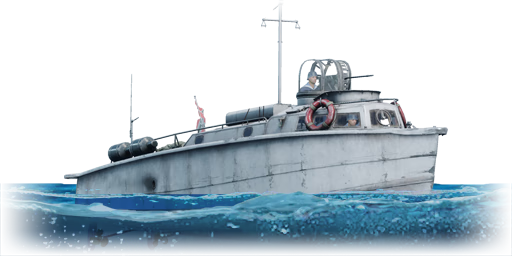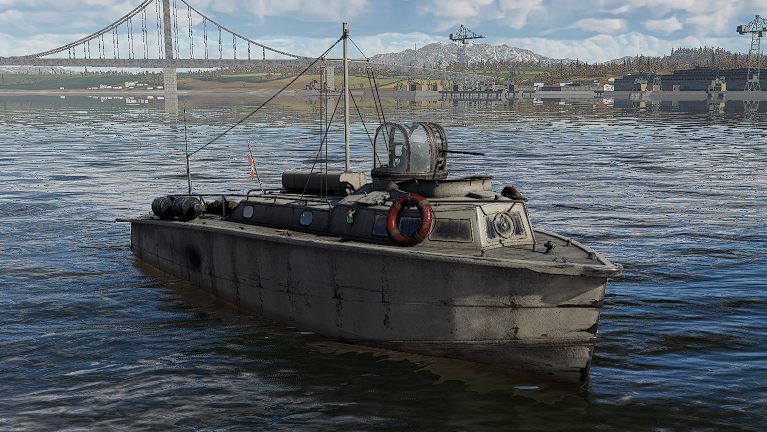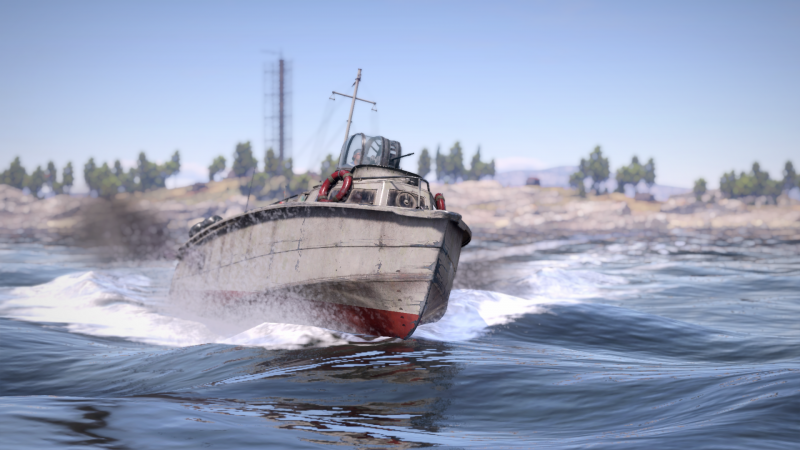LS 3
Contents
Description
The Leichte Schnellboote 3 (lit. "Light Fast Boat 3"), or LS 3 for short, was one of the 12 LS-class fast torpedo boats originally ordered by the Kriegsmarine as an ultra-light version of the larger S-class fast torpedo boat. The LS-class was intended to be carried on-board various auxiliary cruisers operating overseas, and to supplement their convoy raiding operations. The LS 3 was one of the first three boats of the class, being completed on 14 October 1940 at Dornier Werft shipyard. The LS 3 was later assigned to the auxiliary cruiser Komoran, which went on to sink 10 merchant vessels and capture one of them. After a year of duty, on 19 November 1941, the LS 3 was destroyed along with its mothership Komoran in the fateful battle against the Australian cruiser HMAS Sydney, which resulted into both sides being sunk.
Introduced in Update 1.79 "Project X" as part of the fleet closed beta test, the LS 3 is, at first glance, a rather unassuming reserve torpedo boat, equipped with only a single 15 mm machine gun and a pair of average torpedoes. However, despite its status as a reserve vehicle, the LS 3 is capable of causing havoc against enemy teams and even capable of going toe-to-toe against larger and more advanced vessels at a higher BR with a combination of excellent mobility, very small profile, and a fast-firing gun with excellent penetration and coverage. As with any low-tier PT boats, the LS 3's survivability is quite poor, though this can be mitigated by always facing your front at the enemy while also keeping an eye on the surroundings. In addition, while the gun has plenty of ammo count per magazine with very good traverse, it can still overheat very easily, and as such trigger discipline is vital to the success of the LS 3.
General info
Survivability and armour
The LS 3 has no proper armour to speak of, any shell will pierce the hull like a knife through butter. However, the boat's interior is quite spaced and despite the crew of 7 is all located at the front, the bridge can soak a good amount of frontal damage and protect the crew and modules from machine gun-calibre rounds (that are very common in its BR). With an ace crew, it can still remain afloat even with only 3 crews left.
Still, the paper-thin armour of the LS 3 made it incredibly vulnerable against larger calibre rounds that only a nearby blast from these big guns can deal serious or even fatal damage.
Survivability is taking advantage of its small size and manoeuvrability, and being extremely tactical in attack vectors. Avoid engagement as long as possible then strike fast and hard. While it can take a good deal of damage from rounds up to 40 mm, it is big guns with HE rounds found at BR 2.0 that are your greatest threat. The vulnerability in this unarmoured tub is the side, limit exposure as much as possible. Hits on the bow or stern are manageable, minimal crew loss, giving you more time to press your attack. Damage is repaired fast and dries out faster. Again, avoid exposing your side to big cannons as they are often a 1 shot fatality!
Mobility
The LS 3 is an exceedingly capable boat, it can accelerate and decelerate very quickly and turn sharply. Top speed is very good, in the top 10 of fastest boats in-game (excluding hydrofoils). Those qualities will offer a distinct advantage in tiny island maps were one can quickly duck between islands and pounce on targets when they don't expect you. In open water it can do well by evasive weaving and use of smoke screens. Its turret is 360° azimuth by 90° elevation freeing you to manoeuvre any way you need for perfect attack.
| Mobility Characteristics | |||
|---|---|---|---|
| Game Mode | Upgrade Status | Maximum Speed (km/h) | |
| Forward | Reverse | ||
| AB | |||
| Upgraded | |||
| RB/SB | |||
| Upgraded | |||
Modifications and economy
Armament
Primary armament
- 1 x 15 mm MG 151 cannon (2 x 600 rounds)
The 15 mm MG 151 is the same gun found on the rank IV VS-10 and it is one of the deadliest weapon in the game. It has an insane fire rate of 750 rounds per minute, which means it can take small boats and aircraft at its BR in seconds. On top of that, the 15 mm gun is loaded with an impressive API shell that can penetrate up to 33 mm at point blank and 17 mm at optimal range (~1,750 m) and is capable of setting fire when scoring a hit, and HEF shell that can deal a good amount of damage against lightly armoured ship and aircraft, as well as gun being mounted on a 360° turret with no blind spot. This made the tiny LS 3 capable to put up a good fight against enemy boats from much higher BR with an exception of armoured boats and barges
There are three ammunition types available:
- Universal: API-T · HEF
- 15 mm APIT belts: API-T · API-T · API-T · HEF
- 15 mm HEIT belts: HEF · HEFI-T* · HEF · API-T
| Penetration statistics | |||||||
|---|---|---|---|---|---|---|---|
| Ammunition | Penetration @ 0° Angle of Attack (mm) | ||||||
| 10 m | 100 m | 500 m | 1,000 m | 1,500 m | 2,000 m | ||
| HEF | 8 | 8 | 7 | 5 | 4 | 3 | |
| API-T | 33 | 31 | 23 | 16 | 11 | 7 | |
| HEFI-T* | 8 | 8 | 7 | 5 | 4 | 3 | |
| Shell details | ||||||||||||
|---|---|---|---|---|---|---|---|---|---|---|---|---|
| Ammunition | Velocity (m/s) |
Projectile mass (kg) |
Fuse delay (m) |
Fuse sensitivity (mm) |
Explosive mass (TNT equivalent) (g) |
Ricochet | ||||||
| 0% | 50% | 100% | ||||||||||
| HEF | 960 | 0.06 | 0 | 0.1 | 7.65 | 79° | 80° | 81° | ||||
| API-T | 850 | 0.07 | - | - | - | 47° | 60° | 65° | ||||
| HEFI-T* | 960 | 0.06 | 0 | 0.1 | 3.32 | 79° | 80° | 81° | ||||
Like the AN/M2 MG, this gun has large belt capacity of 600 rounds, and long reloading time. However, this cannon overheats easily, and it has very limited overall ammo stock of 1,200 rounds, so trigger discipline is a key to effectively use this weapon.
Additional armament
- 2 x 450 mm LT 1A/1 torpedoes
The LS 3 can carry two 450 mm torpedoes, housed inside the vessel. These torpedoes are highly adequate against any large, slow vessels the LS 3 might face at its BR. However, the torpedoes are extremely short-ranged when stock, with a range of just two kilometres. Their speed of 74 km/h is also relatively average for a torpedo of its size. The "Torpedo Mode" modification should be considered as it increases the range to six kilometres at the cost of speed; this will allow the LS 3's torpedoes to hit far-away targets. With a decent 250 kg warhead, the torpedoes will be able to destroy most destroyer-sized vessels with a single hit.
Usage in battles
The LS 3 is arguably the best overall reserve unit in-game. While it only possesses a single 15 mm cannon it is also one of the best weapons in-game (as it was the same gun mounted on the rank IV VS-10) mounted high on a full 360° rotation turret with a gracious 90° elevation and whopping 30° depression with no blind spots or dead zone. In short, the gun has better coverage than 2, or even 3 guns on other boats, and the bonus is the best AP round of its class. Combine its high top speed, two 450 mm torpedoes, and artillery strike call it is capable of hitting well above its BR.
Success in-game is using the MG 151 correctly. Trigger discipline is absolutely necessary as the gun can overheat very fast and ruin your sortie right there; use 1/2 second bursts unless point blank kill strike. As the MG heats up its precision falls. Up to 1/4 hot is pin point, as it gets 1/2 hot round the rounds start spreading and over that you can see rounds fly everywhere. Range wise one can hit targets at 1,750 m with cold barrel and deal a considerable damage. Best is to be less than 800 m were the accuracy and power rip your targets apart.
While default Universal ammo is perfectly fine, the API-T belt is 25% better against most naval targets you will face (only swaps one HEF for API-T) , while the HEIT belt is very deadly against air targets and some paper-thin targets, but had somewhat less potental against naval targets at range. You will be paying for reloads often, so best is to always have Default as one of your game loads and API-T as other in case you forgot to restock ammo. Again, keep the MG cool, short bursts unless point blank.
What it lacks in the protection area it makes up in mobility. The LS 3 is second to only the G-5 in terms of speed. This in tandem with its incredibly tight turning circle and slim profile, makes the LS 3 very well suited for cover hopping and flanking capture points. Use its speed to sneak in to capture points and rush at vessels not paying attention. Its high top speed also makes it useful to rush cap points at the beginning of a match. That being said, be careful not to overextend, or you will find yourself overwhelmed very quickly. Instead, use its superior speed to be the first to reach a capture point then hide behind an island, selectively engaging enemies that come into the line of sight.
Don't forget your smoke and artillery! Both are incredibly useful to prevent enemies from hitting you. Although a really small target, large cannon (50 mm+) ships have a good chance at hitting you well outside your guns range. Significant threats are the Japanese dual 40 mm Type 91 AA and Bofors 40 mm, and at closer range a battery of 20 mm cannons, like on a PC-451 or S-100. The sides of the LS are the most vulnerable, so facing directly at the enemy as much as possible.
Enemies worth noting:
- MPK-163, SC-497, HMCS Brantford: These submarine chasers are commonly found in basic uptier match (this means you can still face them outside of mixed battle with bluewater fleets). While these ship are quite large and lack any armour to shield off LS 3's guns, their large profile acts as a bullet sponge that is capable of soaking hundreds of rounds with relatively survivable crew loss and allowing them to fight back. These sub-chasers were also carried with large-calibre autocannons that is almost always lethal when being hit. Always make sure to have someone cover your back to cripple them with your gun before get close enough to finish them off with torpedoes.
- Pr.1124 late, SF40 Light: These armoured boats and barges are commonly found in mixed battles with bluewater fleets. Unlike the aforementioned sub-chaser, most of them were impervious to your 15 mm gun and nearly impossible to destroy without torpedoes and/or artillery strikes. However, these platforms were tend to be very slow, thus making them very vulnerable against your torpedoes. Still, they are still able to execute tight turns to evade your torpedoes from up to 800 m away. The best way to kill them is sneaking from outside of their line of sight or using "weaving" method to avoid their incoming fire before launching torpedoes at point blank range (250-300 m).
Pros and cons
Pros:
- Powerful 15 mm MG 151 cannon, which is hilariously effective even against rank III and some rank IV boats
- 360° turret with 90° elevation arc.
- High top speed can make it difficult to lead and destroy
- Very good manoeuvrability, can change direction quickly
- High ammo capacity, able to outlast contemporaries in a firefight with good trigger discipline
- Relatively high rate of fire
- With careful manoeuvring, it can sneak towards and destroy larger vessel with torpedoes
- Due to its reserve status, many will underestimate your damage potential and will not realize until they got destroyed
Cons:
- Gun is capable of overheating, limits the usefulness of high ammo capacity
- Very fragile, incredibly vulnerable to 37 mm and 40 mm fire
- Very low crew count of 7, albeit somewhat tricky to eliminate all of them frontally
- Elevated gun position makes it vulnerable to damage
- Single gun eliminates almost all offensive capability if disabled
- Long reload time
- Low ammo count overall; limited to two magazines
History
Leicht-S-Boot (Light-Torpedo boat, or Midget torpedo boat)
In the mid 1930s, the German navy considered small (12.5 m long), fast torpedo boats launched from carrier ships as tactically viable ideas. Two boats of the class called Light (or Midget) Torpedo boat were built, the first (LS 1) was made of wood, while the second (LS 2) was all aluminum built by Dornier Flugzeugwerke. Yes, this is the same Dornier of the famed Do 17, Do 217, and Do 335 aircraft, but not an insane choice given Dornier's well known history of making seaplanes.
At the time the desired engines (Daimer-Benz Maybachs) were not available thus forced to used less powerful Jumo 205 Diesels, and neither were the torpedoes. Instead of torpedo boats they became minelayers, and combined with other issues resulted in disappointing performance and the idea was put on hold at start of war in Europe.
The next year the idea was revisited, this time Dornier's all metal boat was chosen, Daimler-Benz MB 507 light Diesel engines and so were 45 cm torpedoes. In addition a new 15 mm MG 151 cannon was installed in a turret on the roof. Two were built, the LS 3 (delivered on October 10th, 1940) and LS 4. There is a deviation from historical and game at this point, as the records indicate the LS 3 carried 4 mines, not torpedoes, and the LS 4 would also have 15 mm cannon, not 20 mm (but the MG 151 was interchangeable, so would be easy to upgrade to 20 mm MG151/20).
Over the years a total of 12 LS was built, with both Jumo 205 and Daimler-Benz MB 507, the latter carrying torpedoes. Surviving combat records place operations in the Aegean, Mediterranean, and Black Sea areas. Fate of the boats is lost, but it seems that at least one, LS 12, was captured and used by the Soviets after war.
Media
- Skins
- Videos
See also
- Related development
External links
- [Forum Discussion] Dornier Leicht S-Boot
- [Die Schnellboot-Seite] S-Boats in the Kriegsmarine 1935 - 1945
| Dornier-Werke GmbH | |
|---|---|
| Motor Torpedo Boats | |
| Leichte Schnellboote (LS) | LS 3 · LS 4 Esau |
| See Also | Dornier Aircraft Corporation |
| Germany boats | |
|---|---|
| Motor torpedo boats | LS 3 · LS 4 Esau · KM-5 · VS-10 |
| S-38 · S-38b · S-100 · S-147 · S-204 Lang · S-701 | |
| R-301 | |
| V-990 | |
| Jaguar · Hugin · Pfeil | |
| Motor gun boats | R-41 · R-130 · Krischan der Große |
| Motor torpedo gun boats | Albatros · Bussard · MZ1 · Pr. 206 |
| Minelayers | VS-8 |






